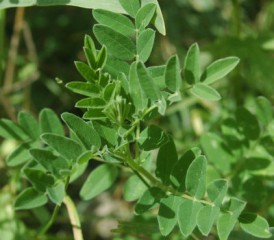Peritoneal mesothelioma survivor Ruth Phillips takes several vitamins, antioxidants and herbs. She undergoes regular checkups to monitor the effects of the supplements she takes. “This is kind of like a full-time job, just staying alive. Take this stuff, that stuff, do this, do that. It really never ends. But that’s how it is when you’re trying to cohabitate with cancer.”
Herbal Medicine and Cancer
Herbal medicine for mesothelioma includes Essiac tea, astragalus, ginger, turmeric and others. It is used as a complementary therapy to ease cancer symptoms and relieve treatment side effects. Mesothelioma patients should consult their doctor before taking any herbal medicine.

Types of Herbs Used in Mesothelioma Treatment
Research suggests some herbal medicine may help people cope with cancer symptoms and side effects of cancer treatment. Research doesn’t indicate herbal medicine can replace conventional cancer treatment. No herb has been proven to control or cure any kind of cancer.
- Burdock Root: A 2011 review published in Inflammopharmacology discusses lab studies of burdock root that indicate the herb has anti-inflammatory, antibacterial, anti-cancer and liver-protecting properties. It hasn’t been proven to treat cancer in humans, but it may reduce inflammation and help patients recover from liver damage after cancer treatment.
- Essiac Tea: An herbal tea blend, it contains herbs known for their immune-boosting effects, including burdock root. Research shows Essiac tea doesn’t cure cancer, but it does contain more antioxidants than red wine or green tea. The Memorial Sloan Kettering Cancer Center conducted about 18 studies on Essiac in the 1970s and 1980s. These studies found Essiac didn’t boost the immune system or kill cancer cells.
- Ginger: This herb shows anti-inflammatory and anti-cancer effects in lab studies. It can also reduce chemotherapy-related nausea and vomiting, according to a 2000 review published in the British Journal of Anaesthesia. But ginger should be strictly avoided before and after surgery. It promotes bleeding and patients with a low platelet count should avoid it.
- Hypericin: This compound is found in St. John’s Wort and it may help kill cancer cells. According to a 2000 study published in the Medical Journal of Australia, hypericin makes certain cancer cells more likely to die after photodynamic therapy, which is an experimental treatment for mesothelioma.
- Moringa Tree: A 2006 test tube study published in the Journal of Experimental Therapeutics in Oncology found a compound in moringa tree effective at killing ovarian cancer cells. Other research suggests it may help cancer symptoms including difficulty breathing, cough, sore throat, fever and joint pain.
Cancer patients should exercise caution when using herbal products, as the quality control of these products may be inadequate. An example from the 1970s highlights the potential risks: A commercially available burdock root tea was discovered to be contaminated with atropine, a chemical known to cause irregular heartbeat and blurry vision. It’s crucial for cancer patients to closely observe and assess the effects of any herbal remedies they consider using.

Herbs for Treatment Side Effects
Several herbs may help control the side effects of conventional cancer treatment. For example, research done in humans suggests that mistletoe reduces the side effects of chemotherapy in lung cancer patients, and helps people with cancer tolerate higher doses of gemcitabine, which is used to treat mesothelioma.
Turmeric contains a compound know as curcumin, which research shows may be safe to combine with gemcitabine in cancer patients. It may also reduce bruising in surgery patients when combined with bromelain and arnica. Aloe vera taken during chemotherapy helped prevent mouth sores according to a review published in Cochrane Database Systematic Reviews.
| Side Effect | Herbal Medicines |
|---|---|
| Nausea or vomiting | Ginger, Marijuana, Grape Seed, Peppermint, Roman Chamomile |
| Appetite loss | Marijuana, Dandelion, Devil’s Claw, Lemon Balm, Siberian Ginseng |
| Diarrhea | Bilberry, Blackberry Leaf, Chamomile, Huanglian, Marshmallow Root |
| Constipation | Aloe Vera, Fenugreek, Ragweed, Senna, Psyllium |
| Fatigue | Astragalus, Chlorella, Ginkgo Biloba, Gotu Kola |
| Skin irritation | Calendula, Holy Basil, Milk Thistle, Panax Ginseng |
Doctors don’t recommend cancer patients take herbal medicine while undergoing cancer treatment. If you want to try herbal medicine during cancer treatment, talk to your oncologist about it so they can monitor your response and warn you of potential drug interactions. Some of these herbs might be safe to take after cancer treatment is completed, but you should get approval from your oncologist first.
According to studies, the herbs most commonly studied in cancer treatment include astragalus and dong quai. Much of the research has investigated these herbs in combination with chemotherapy.
Astragalus

Research on astragalus shows it may reduce the side effects of platinum-based chemotherapy agents such as cisplatin and carboplatin. These are two of the most effective chemotherapy drugs for mesothelioma.
A 2012 Chinese study published in Medical Oncology found improved quality of life among lung cancer patients who received a combination injection of astragalus, cisplatin and vinorelbine vs cisplatin and vinorelbine alone. The patients who received astragalus had better physical function and improved appetite. They also experienced less fatigue, pain, nausea and vomiting.
Make sure you discuss astragalus with your oncologist because it’s a potent herb. It can alter the way your body processes chemotherapy in ways that may help or hurt depending on the patient.
Dong Quai
Traditional Chinese Medicine uses the herb dong quai to support overall wellness. The herb may offer additional benefits to cancer patients receiving doxorubicin, which is a chemotherapy drug used in the treatment of mesothelioma.
While there have been studies suggesting potential benefits of dong quai, it’s important to note this herbal supplement can interact with certain medications and isn’t recommended for women with estrogen-sensitive cancers. Furthermore, its safety for mesothelioma patients remains uncertain, and further clinical trials are needed to evaluate its effects.
One study published in 2007 in Basic and Clinical Pharmacology and Toxicology indicated dong quai may have a protective effect against the heart damage doxorubicin can cause. Additionally, a study published in 2006 in Oncology Reports suggested dong quai may offer protection against adiation therapy-induced lung inflammation.
Herbs for Cancer Symptoms
Certain herbal medicines may help mesothelioma cancer symptoms such as pain and difficulty breathing. Some of these herbs have been studied in cancer patients, but some of them haven’t.
| Symptom | Herbal Medicines |
|---|---|
| Pain | Marijuana, Boswellia, Curcumin/Turmeric, White Willow Bark, Arnica |
| Shortness of breath | Hawthorn, Eucalyptus, Lobelia, White Pine Bark |
| Coughing | Black Cohosh, Slippery Elm Bark, White/Western Yarrow |
| Anxiety or stress | Kava, Passionflower, Magnolia Bark |
| Depression | St. John’s Wort, Valerian |
| Sleeplessness or insomnia | Passionflower, Valerian, Chamomile |
Because of the complexities of interactions and the specific considerations for different cancer types, mesothelioma patients must consult with their health care providers before considering the use of any herbal supplement. They can advise when it may be safe to take supplements and warn you about potential drug interactions.

How Does Herbal Medicine Work for Cancer?
Clinical trials that combine herbal medicine with cancer therapies are relatively new to the United States. China has performed such trials since the early 1900s. Cancer doctors rely on clinical trials to recommend treatments that are proven effective. The lack of clinical trials on herbal medicines has limited what doctors can safely recommend.
14%
Percentage of patients over 81 who tried complementary therapy such as herbal medicine.
Source: The Mesothelioma Center at Asbestos.com 2023 Survey
Herbs may seem harmless, but sometimes they can interfere with cancer treatment. For example, some herbs can prevent chemotherapy and radiation therapy from killing cancer cells. Certain herbs enhance the effect of chemotherapy in a toxic way that leads to unwanted side effects.
Herbal medicine may come in the form of tablets or capsules, creams, teas or tinctures (an alcohol-based concentrate). Doctors recommend patients avoid herbs during treatment. It won’t be safe until research can identify which herbs are safe to combine with cancer treatment. People with cancer should get approval from their oncologist first before they take any kind of herbal medicine because some herbs may negatively impact the outcome of cancer treatment.

I tell my patients to check with their physician before starting any new medication. This is to make sure that one treatment (particularly Chinese herbs) doesn’t interfere with another. While Chinese medicine continues to be researched, certain therapies such as acupuncture and acupressure could provide benefits in managing the myriad side effects that can occur with treatment such as chemotherapy.
Is Herbal Medicine Effective and Safe for Mesothelioma?
In general, herbal medicines aren’t as effective as conventional medicine for mesothelioma. While some people feel relief from herbal medicine for mild symptoms or side effects, many people get more relief from prescription medication.
Studies conducted in test tubes and animals have shown some anti-cancer effects of various herbs, but these results haven’t been replicated in human trials. Research on other herbs has also shown a mix of benefits and risks for people with cancer. For example, some herbs promote bleeding with surgery, block the body’s removal of cancer drugs or increase their toxicity. delaying the metabolism of certain drugs.
Potential Benefits of Herbs
- Boost the immune system
- Ease cancer symptoms
- Reduce treatment side effects
- Slow cancer spreading (metastasis)
- Attack cancer cells
The U.S. Food and Drug Administration designates most herbs as GRAS, or generally recognized as safe. They often have a lower risk of side effects because they’re less potent than pharmaceuticals. Constipation is the most common side effect. However, herbal remedies are still a type of medicine. Make sure to get approval first from your oncologist.
Research in a developing field of medicine known as integrative oncology attempts to understand which complementary therapies, including herbal medicines, are safe and effective to combine with conventional cancer treatments. Most of the research has been conducted in test tube studies or mouse studies. Some research involving humans has been conducted internationally, but no large, double-blind controlled clinical trials have been conducted in the U.S.
Consult Your Doctor About Herbal Medicine
The importance of discussing herbal remedies with your oncologist before buying or trying them can’t be stressed enough. All too often patients don’t discuss the supplements and herbs they want to take with their doctor first.
Your oncologist has your best interest at heart and only wants to protect you from potentially harmful interactions. In many cases, your doctor will give their approval to take herbal remedies after you complete treatment.
I just figured I had nothing to lose, so why not try something like this. I feel great, so you could say I’m a believer now. People say I look better now than before I got sick. I’m sure this moringa had something to do with it.
A common misconception is that natural products can’t be harmful or that they’re always safe to combine with pharmaceutical medications. Many natural substances such as arsenic and tobacco are poisonous and carcinogenic. The effects of herbs can range from mild to potent depending on the person taking them and the medications they’re using.
It’s wise to thoroughly research the herbs you want to try and take your research to your oncologist. This allows your doctor to advise you with as much information as possible.
Commonly Asked Questions About Herbal Medicine
- Can herbal medicine cause side effects?
-
Herbal medicines may be less likely to cause side effects than traditional drugs. But patients can still experience complications. Some herbs can cause negative interactions with chemotherapy drugs. Others may prevent blood from clotting properly after surgery. Closely monitor how you feel before and after taking herbal remedies. Patients should always consult with their doctor before trying herbs to avoid complications.
- Is herbal medicine regulated in the United States?
-
Dietary supplements don’t have to undergo FDA testing before reaching the market. Some patients have unknowingly bought supplements contaminated with arsenic, lead and mercury. Patients should avoid herbal medicines that are marketed as cures for cancer. These remedies are often produced without any scientific evidence to support the manufacturer’s claim.
- How can I find safe herbal supplements?
-
To find safe, uncontaminated herbs, patients should only buy products from reputable companies with a United States Pharmacopeia label. Patients can also look for one or more quality labels like USP that appear as specific acronyms on the herbal supplements. These labels include: GAP for Good Agricultural Practice, GLP for Good Laboratory Practice, GMP for Good Manufacturing Practice and GSP for Good Supply Practice.
- Do clinical trials investigate herbs for people with cancer?
-
You can inquire about joining a clinical trial investigating an herb in combination with cancer treatment. These trials aren’t common, but they do closely monitor patients for harmful interactions. They take the precautions necessary to prevent unwanted side effects such as testing herbs for contaminants before administration.




